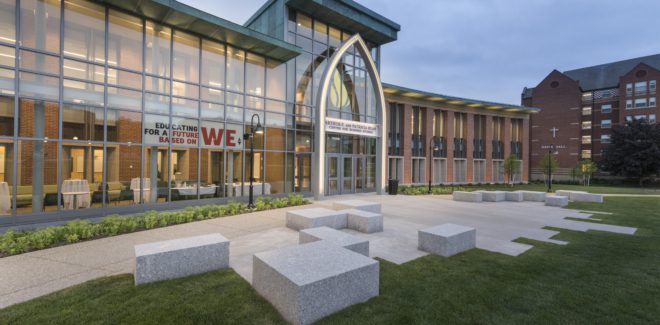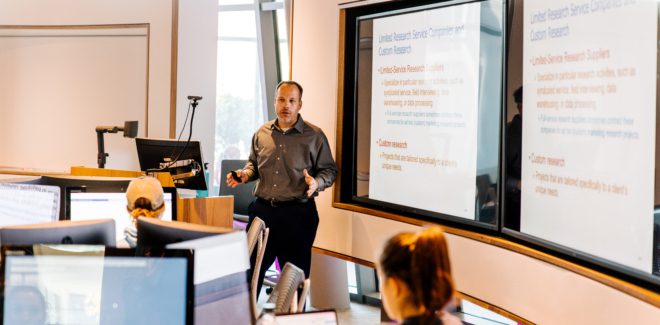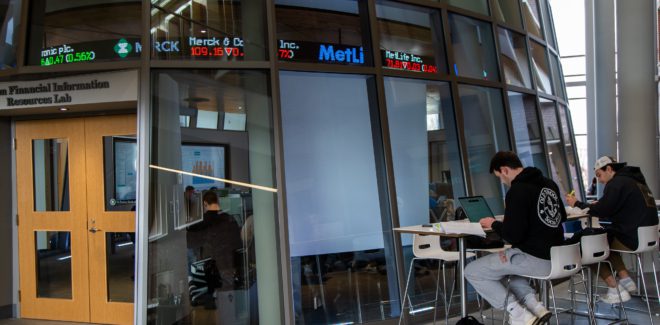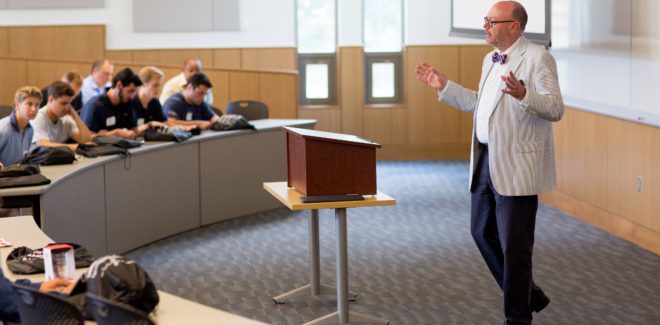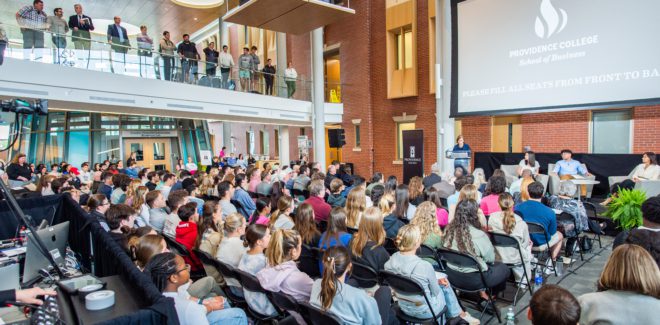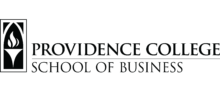Providence College’s School of Business ranked 37th in this year’s 2023 rankings, maintaining their position from last year. For the last few years, the B-School has broken into the upper 30’s in the rankings, whereas in further years past, they hovered in the 40’s.
Providence had a slightly more selective acceptance rate this year, accepting only 48.40% of incoming students this year as compared to 52.51% for last year. Another upward trend are the school’s SAT scores – with an average of 1322 for the most recent incoming class as compared to 1318 for last year’s class.
Employment rates held strong, with 95.83% of the Class of 2023 securing full-time employment within three months of graduation, nearly the same as last year’s score of 95.35%. As far as internships go, most of the Class of 2023, 95% of them, experienced at least one business-focused internship during their time at Providence.
The Academic Experience category was Providence’s strongest methodological category, as they finished 28th.
Providence College’s business education strongly emphasizes liberal arts and ethics with an abundance of opportunities to apply their knowledge and obtain relevant, real-world experience.
EMPHASIS ON LIBERAL ARTS AND ETHICS
Liberal arts serve as the foundation for business education at Providence with a strong focus on liberal arts. The curriculum features core focus and competency requirements in addition to linked major and minor course content. Undergraduate business majors at Providence include Accountancy, Finance, Management, and Marketing.
Additionally, all Providence undergraduates are required to take two years of seminar courses for the Development of Western Civilization Program, where they explore human history through many perspectives — from literature to philosophy to theology to art, and more.
First-year business students attend diversity and inclusion workshops focused on unconscious bias and working across differences. The workshops are designed to help students learn how to navigate collaborating with people from a variety of backgrounds in the workplace.
Students can also compete in the college’s Michael Smith Regional Ethics Case Competition, where student teams analyze a business ethics case and present their solutions to a panel of judges. The winning team wins a $2,400 prize.
Ethics and an understanding of how to work across differences are more important now than ever before as employers seek out not only skilled and capable workers, but individuals who have a strong grasp on soft-skills and collaboration. Providence alumni also rate the B-school’s ability to offer opportunities to nurture and improve students’ soft skills relatively high at an 9.14 average rating.
REAL-WORLD PROJECTS
Providence students have a number of opportunities to apply their knowledge in real-world scenarios whether through projects or case competitions.
Marketing students can also participate in the annual American Marketing Association (AMA) Collegiate Case Competition, an event that brings together marketing students to solve and present a case study. Last year’s competition asked students to develop a comprehensive marketing plan targeting Generation Z in an effort to increase membership and relevance among American college students.
“Participating in the AMA Challenge was a prominent part of my senior year and helped me prepare for project management in my career,” one alumni said.
Students interested in finance can participate in the Student Managed Portfolio, where they invest real money from the Providence College endowment. Unlike many student-managed funds, the PCSB Student Managed Portfolio extends to three different classes of assets: equity, fixed income, and alternatives.
If you’re looking for a business education that includes an emphasis on in-demand soft-skills with plenty of opportunities to gain real-world experience, look no further than Providence College’s School of Business.
Alumni say:
“All my project work and capstone work not only set me up for the professional skills needed to be successful but how to teach and encourage others as well. My first management class was set around creating a business with a product or service, with a group of people I didn’t choose to partner with but was told I would partner with. My capstone required me to research a business with people I was acquainted with but did not choose to be grouped with. This is just like the real world. It prepared me to set a common goal with individuals that I may not have known well but I was able to walk away with calling them friends. This prepared me exactly for what the future in the real world would be like.”
“My capstone class had a project where we created a business from scratch, made a business plan, and wrote a whole report about the things we would do to run the business.”
“I completed projects and simulations that helped me gain real world experience. One example was acting as an audit firm that helped a client throughout the semester with a variety of questions they had. It involved research, preparation, and mock meetings that felt like real world situations. The professor provided helpful feedback at the end.”
“At Providence College, I was a double major in Management and Marketing with a minor in German. My management and marketing capstones really helped as I developed skills that were easily transferable in my first job as we spent a substantial amount of time doing competitive analyses and scoping out the market opportunity. Furthermore, we presented more in my last year at Providence College which was essential as I transitioned into a sales role out of college.”
“I was involved with the Student Managed Investment Fund course offered at Providence College, which was instrumental in providing real world, applicable skills that are needed in the finance industry. The professor was a practitioner in finance and urged everyone to treat the class like a job, as opposed to a typical collegiate course. It was one of the most useful courses I’ve taken that provided me with the tools and experience needed to demonstrate my knowledge of the financial markets in interviews, in my internships and on the job today.”






